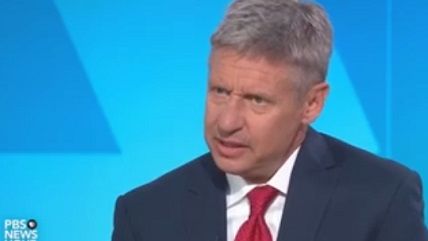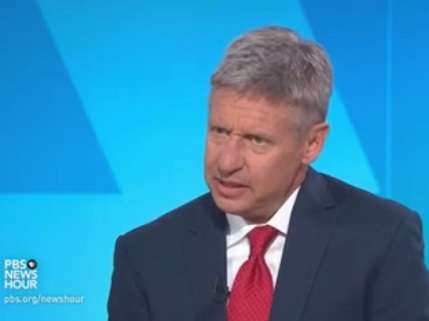Gary Johnson on Foreign Policy & War: We Need to Involve Congress in Decisions
The Libertarian nominee pitches himself to a mainstream audience


Libertarian presidential candidate Gary Johnson appeared on PBS' NewsHour this afternoon to answer questions about libertarianism and his candidacy from Judy Woodruff.
Asked whether he'd join NATO if Russia's Vladimir Putin "were to go into a country in Eastern Europe," Johnson pointed out the U.S. was involved in "many treaties with foreign countries where we are obligated to defend the border," but that these treaties weren't ratified by Congress.
While the North Atlantic Treaty that established NATO was ratified by the U.S. Senate, Johnson's broader point about Congressional involvement stands. "We need to involve Congress in all of these [foreign policy] decisions that they've abdicated to the executive and the military," Johnson insisted to Woodruff.
Johnson, who has called himself a "skeptic" of intervention, and whom Woodruff called a "non-interventionist but not an isolationist," is poised to enable Congress to reassert its role in foreign policy decision making, and specifically the decisions to go to war. Members of Congress should consider Johnson's stance whether or not he gets elected—a Congress that takes its responsibility in the war decision making process seriously is critical in a potential Hillary Clinton or Donald Trump presidency, presidencies that would largely be driven by cults of personality and the idea of an imperial presidency.
In response to the Putin question, Johnson also insisted that as president he would "avoid drawing lines in the sand," pointing out that President Obama often drew lines in the sand and then allowed them to be crossed, weakening U.S. foreign policy.
Woodruff pressed Johnson to find something about Hillary Clinton that would warrant the kind of criticism Johnson's vice presidential running mate, Bill Weld, levied at Trump, comparing his immigration plan to Nazi policies that led to the Holocaust. "I believe that Hillary Clinton is going to grow government, that government is all about giving out things," Johnson said. "Nothing is free, somebody pays for that." Eventually, Johnson landed on the foreign policy criticism, calling Clinton "a primary architect of our foreign policy, which has made the world less safe." For all of Trump's rhetoric, Clinton is the one with blood on her hands already, a point that could be useful for Johnson to make between now and November as he tries to peel votes away from both sides.
On the domestic front, Johnson insisted he would not phase out Social Security, saying it was "absolutely fixable." He also rejected questions by Woodruff about issues like seatbelt laws (he says he wears them) and texting while driving laws, pointing out those issues were for local and state governments. Asked about food safety, he said that his proposal for a 20 percent reduction in federal spending was "not the end of the world" and that he'd welcome any legislation from Congress that shrunk the role of government, while insisting government existed to protect people against government, corporations, and other entities. He also called on eliminating the income tax and corporate taxes and replacing them with a federal consumption tax. Abolishing the corporate tax, he said, would lead to the creation of tens of millions of jobs.

Show Comments (236)